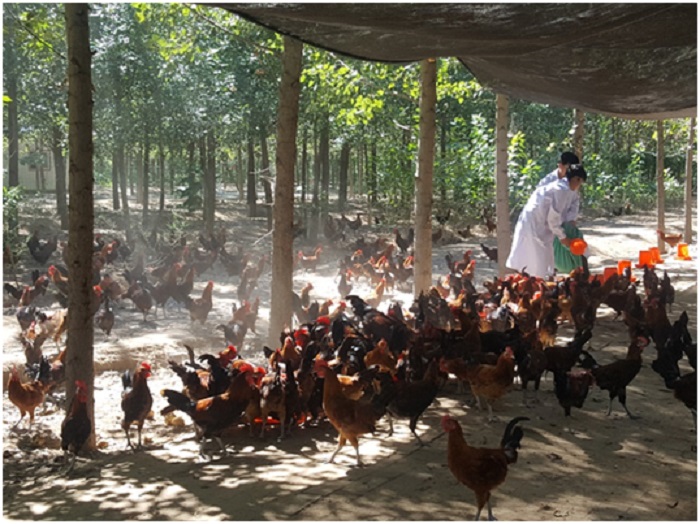



China’s e-commerce giant JD.com intends to roll out a program to empower rural areas in the next three years. By funneling high-quality resources to these areas, the company aims to facilitate a growth of one trillion yuan (about $149.9 billion) output value in rural areas.
JD.com has helped sell more than three million kinds of products from poverty-stricken areas from the beginning of 2016 to Sept. 30, 2020, data suggest.
During the period, the company helped realize over 100 billion yuan worth of sales for poverty alleviation, which has directly driven income growth for more than one million registered poor households.
In the past five years, the transaction volume of agricultural products sold via e-commerce platform of JD.com exceeded 500 billion yuan.
Wang Aihua, a once poverty-stricken resident in Wangxianlan village, Wuyi county, north China’s Hebei province, embarked upon a road toward better life in 2016 when he received 100 baby chicks under an innovative e-commerce poverty-alleviation project of JD.com.
“After submitting the application for the project, what we need to do is only to raise the chicks, as all the other things are taken care of by a special group of young people,” said Wang.
These young people Wang mentioned are staff members of JD Fresh, the fresh food arm of JD.com. According to Wang, these people helped poor households apply for an interest-free loan of 4,500 yuan each as a special fund for raising chickens from a financial service platform of JD.com.
After the loans were granted to poor villagers, the cooperative of the village purchased baby chicks and poultry suppliesfor them, Wang said, adding that when the chickens grow up, the company collect them and then pays poor residents cash dividends according to the results of their respective efforts.
In a free-range chicken raising base in Baoxianlan village, Wuyi county, an intelligent monitoring system is applied to keep the environment of the base under surveillance 24 hours a day.
Each of the chickens wears a special “bracelet” with a built-in quality tracing system and an anti-counterfeiting QR code. People can immediately get the unique identification information about a chicken by scanning its QR code, thus tracing back its origin.
“The chicks don’t grow fast, yet they could be sold at a good price,” said Wang, adding that many of the chickens can be sold to major cities.
The first 100 chicks helped Wang’s family earn 3,000 yuan in 2016. So far, the family has already shaken off poverty and is marching toward a richer life.
If developing industries is considered the guarantee of poverty alleviation, then facilitating employment is a more direct way of helping villagers become better off.
Located in the Taihang Mountains, Pingshitou village, Fuping county, Hebei province, used to be isolated from the outside world. Rugged mountain roads in the village had hindered the place from development and prosperity.
In 2017, staff workers at JD.com encouraged residents in Pingshitou village to raise pigeons.
After receiving systematic training, poor households with people who have the ability to work have been allowed to raise pigeons in their own yards once their yards meet the standards after renovation.
For poor households without people who can work, the cooperative in the village helps them raise pigeons in a unified manner.
Meanwhile, professionals and technicians sent by the company and local government have also preaching knowledge about the business and provided training for local people at a regular basis.
These efforts have attracted more and more residents to the industry. Villagers working on pigeon farms or the cooperative could now earn over 3,000 yuan per month.
By encouraging rural residents to keep chickens, pigeons, ducks and fish, JD.com has built its own brand for poverty alleviation and thus improved the value of products in poor areas, according to an executive with JD Fresh.
While promoting such a poverty alleviation model in more areas, the company has not only got poverty-stricken residents to actively participate in the project, but provided green, pollution-free and high-quality products for consumers, realizing win-win results for poor households, consumers and companies involved.
On January 22, 2016, JD.com signed a strategic cooperation framework agreement with the State Council Leading Group Office of Poverty Alleviation and Development and officially started its e-commerce-based targeted poverty reduction efforts.
The e-commerce platform has established over 250 poverty alleviation specialty stores covering over 20 provincial-level regions.
As many poor regions had difficulty selling agricultural products since the beginning of this year due to the COVID-19 epidemic, JD.com promptly opened up a green channel for fresh food from rural areas.
It has helped with the sale of 1.3 million kinds of agricultural products online and registered a total sales volume of 300 million units.
In recent years, the company has accumulatively provided jobs for 50,000 people from poor areas.
It also participated in a campaign jointly hosted by the Ministry of Human Resources and Social Security and the State Council Leading Group Office of Poverty Alleviation and Development in May, during which it offered 70,000 jobs for people in poor areas.
As Chinese often say, “Give a man a fish and you feed him for a day. Teach a man to fish and you feed him for a lifetime”.
As a technology and service company based on supply chain, JD.com is committed to bringing the new generation of infrastructure that the company has been building for a long time to the countryside, and helping industries in rural areas achieve leapfrog development so as to lead rural residents to a road to prosperity, said an executive with the company.


The Humanitarian Service Diamond Awards has.
A Chinese Company, Inner Galaxy Steel.


The Programme Coordinator, Regulatory, Compliance and.


A Non-Governmental Organization (NGO), Committee for.
The Trustfund Pensions Limited has chided.


The House of Representatives Committee on.
The China General Chamber of Commerce.


Senator Chuka Utazi who represented Enugu.


An Abuja based Legal Practitioner, Ugochukwu.


The African business community in Yiwu,.
Leave a Comment